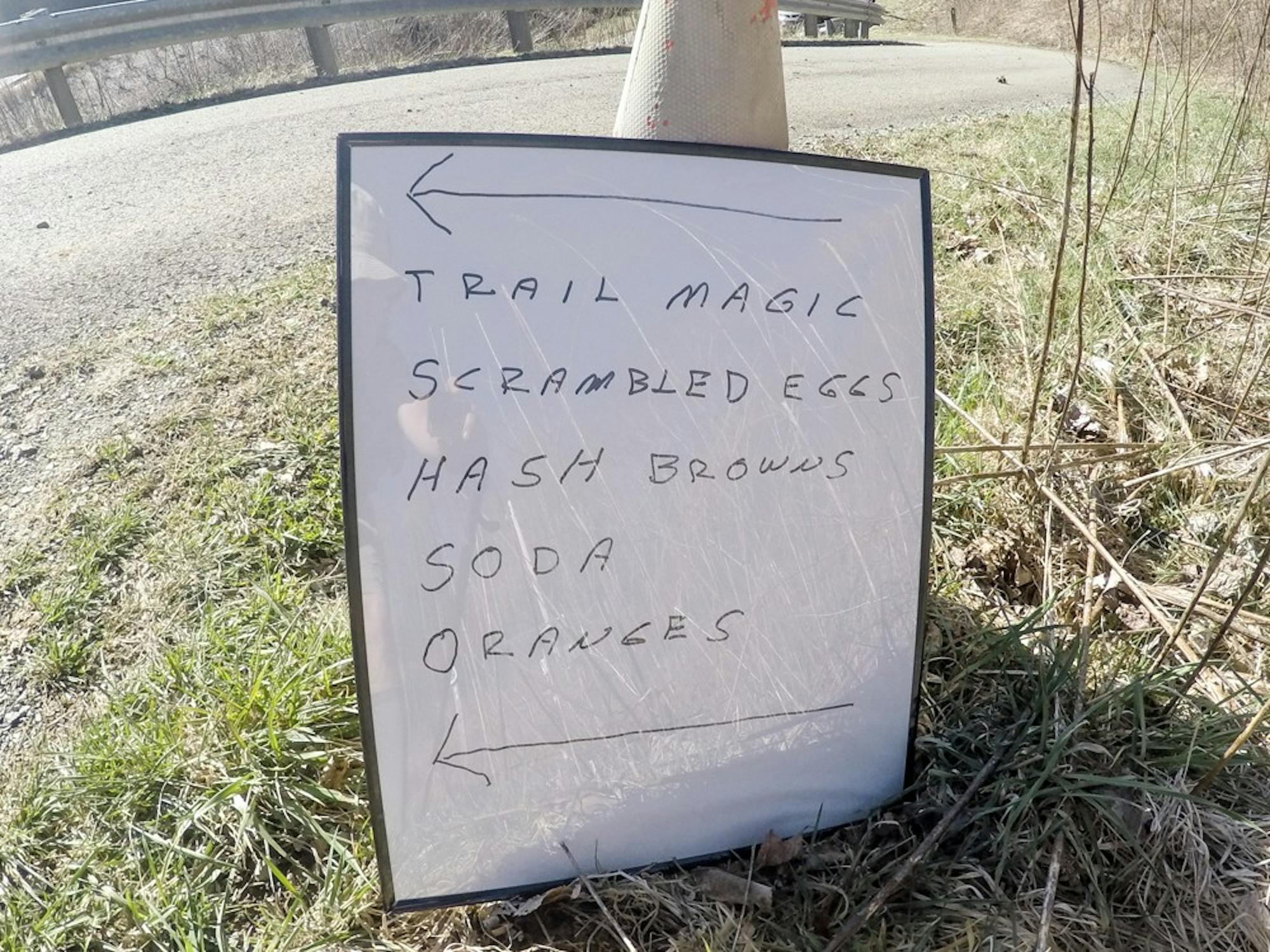The Appalachian Trail, commonly called the A.T., is an arduous trek spanning over 2,000 miles from Georgia to Maine. As thru-hikers slowly approach their final destination, which can easily take five to seven months for those completing the entire trail, they are likely to come across unsolicited acts of kindness. Sometimes, these come in the form of a cooler left on the trail with free drinks and snacks inside. Other times, locals may set up grills and tents so thru-hikers can eat and sleep for free.
Regardless of the various forms in which those acts of kindness come, they all make up a very special aspect of the A.T. known as “trail magic.”
Perri Haser ’17, who completed the A.T. alongside Nick Thyr ’17 in 2016, defined trail magic in her own words.
“My working definition of [trail magic] is anything that someone gives you unsolicited that is in direct support of your hike — that can be food, that can be lodging — and it’s something that you don’t pay for necessarily,” Haser said. “Anything that anyone does to help you along emotionally or practically, I consider trail magic.”
John Brady ’19, who hiked the A.T. in 2015, spoke of how uplifting trail magic can be to hikers, for whom feelings of discouragement and self-doubt are common as they continue along the trail.
“A lot of the time, trail magic came just when you needed it,” Brady said. “If you were down, if you were hungry or if you ran out of water or something, there would oftentimes be trail magic right around the corner.”
Even though Haser and Brady hiked at separate times, they both vividly recounted specific instances in which trail magic positively impacted their hikes. The similarities of their memories reinforced just how important trail magic is to the general A.T. experience.
Towards the beginning of her hike, Haser met an older woman whose trail name is “Cuppa Tea.” Cuppa Tea, who had many connections in the area, brought trail magic to Haser and Thyr when she knew others in the area who were willing to help thru-hikers.
“There was one night in particular in Tennessee where my hiking partner and I were put up in a hotel for free for a night because the friend of [Cuppa Tea] had a timeshare [at the hotel],” Haser said.
Access to a warm shower, laundry facilities and a real bed are luxuries for thru-hikers, and Haser emphasized how grateful she was for that moment of trail magic.
Brady also met several generous individuals along the trail who showed him that trail magic can take a variety of forms. For example, he had the pleasure of meeting a man known by his trail name, “Fresh Ground,” at his well-known Leapfrog Café. Fresh Ground attempted to hike the A.T. several years ago before stopping partway through and realizing that, at that point in his life, completing the A.T. was not for him. However, he has since given trail magic to northbound thru-hikers, driving in his minivan to follow groups of thru-hikers and offer them food and shelter.
“[Fresh Ground] was always looking to cheer others up, which is something that was really inspiring,” Brady said.
Brady fondly remembers Fresh Ground giving away food, such as bananas. Fruit is not a type of food that thru-hikers commonly carry because of its heavy weight relative to number of calories, so the bananas were a sweet treat.
While trail magic might sound like a perfect way for volunteers to help make thru-hikers’ journeys a little easier, it does come with its own set of problems, especially when food and drinks are left unattended in a cooler. Thru-hikers may contribute to the risk of breaking “Leave No Trace” principles — practices which thru-hikers should observe to prevent negatively impacting the environment around them — by leaving their trash in coolers. Many coolers can be easily opened by curious animals, who can then consume the coolers’ contents and quickly spread trash across long distances.
“The accountability of [trail magic] is so low, and who’s responsible for [cleaning up] is unclear,” Haser said. “On the one hand, someone was nice enough to do this great thing for you and put out drinks or a snack. On the other hand, you didn’t ask for it, so why should you have to then carry it for the next week?”
The Appalachian Trail’s official website provides suggestions for ensuring that trail magic is sustainable, such as “be present if you provide food or drink” and “locate events in developed areas on durable surfaces.” Evidently, not all volunteers follow those suggestions, but groups such as the Appalachian Trail Conservancy are making efforts to improve volunteers’ environmental awareness.
“I attended a conference held by the Appalachian Trail Conservancy for volunteer clubs because Dartmouth maintains 50-something-odd miles of the Appalachian Trail,” Brady said. “The focus of [one session] was how to sustainably provide trail magic, because if you’re providing food to 40 to 50 people right at a highway crossing, it can be crowded … and trash can be left behind.”
Trail magic may not always be perfect, but for many thru-hikers, the spirit and goodwill behind trail magic will always be more important than the actual gifts. Brady told the humorous story of one fifth grader who lived near the A.T. and left trail magic in the form of clothes. Along a section of the trail, the young volunteer gave away items such as socks with notecards detailing his own dream of hiking the A.T. when he grew older.
It is unlikely that a thru-hiker would benefit from a pair of cold, wet socks, but the intention is what truly stands out. In the countless small towns along the A.T., a sense of generosity has become ingrained in the local culture. It is that sense that fuels trail magic and helped make both Haser’s and Brady’s hikes special.
The Appalachian Trail can be grueling, and only a small fraction of those who begin the hike manage to complete it. Thru-hikers’ motivations for taking on such a challenge can vary drastically, but one thing is for certain: trail magic can keep them going.




